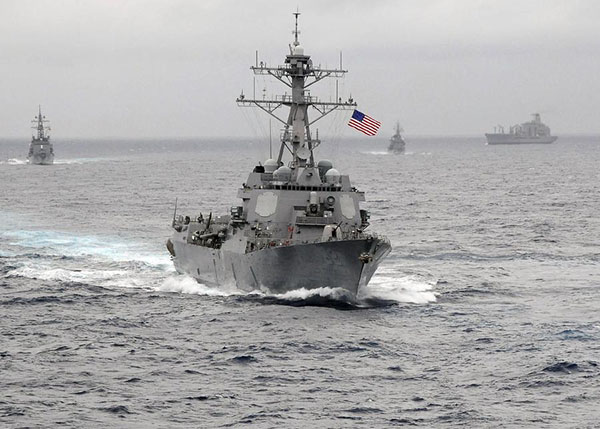EU should urge US to stop distrusting China
By Fu Jing (China Daily) Updated: 2015-11-10 08:16
 |
|
The US Navy guided-missile destroyer USS Lassen sails in the Pacific Ocean in a November 2009 photo provided by the US Navy. [Photo/Agencies] |
In recent years, China has responded positively to appeals of shouldering more international responsibilities. Even the communique issued after the recent Fifth Plenum of the 18th Communist Party of China Central Committee, which was held mainly to hammer out the 13th Five-Year Plan (2016-20), said China would shoulder more global responsibilities.
Still, some countries are not ready to accept China in its new role. For example, the United States is not really serious about seeing China play a bigger role on the global stage.
Shortly after President Xi Jinping paid a state visit to the US in September, Washington said the Trans-Pacific Partnership Agreement excludes China and it doesn't want Beijing to help write the international trade rules. Worse, the US sent a naval vessel in the waters close to China's islands in the South China Sea, which sparked security concerns in the region.
In sharp contrast, Xi held new rounds of fruitful talks with some European countries in less than 20 days. During his state visit to the United Kingdom last month, Xi held fruitful meetings with Queen Elizabeth II and Prime Minister David Cameron. Apart from a number of cooperation agreements, the two countries also vowed to build a global partnership.
Following that, Xi met with King Willem-Alexander of the Netherlands, German Chancellor Angela Merkel and French President Francois Hollande, which prompted many observers to label his Europe visit as the "European season" of China's proactive diplomacy.
Aside from the bilateral commitments during those meetings, China also agreed to work for a deal at the UN climate change conference in Paris next month, jointly find ways to boost global growth, push for global governance reform, help realize the UN sustainable development goals by 2030 and try its level best to deliver the promises during China's G20 presidency in 2016.
- China, US avoid 'trap of rivalry': US official
- China-US relations: Election rhetoric and ground reality
- China, US set ties 'in right direction'
- Working on positive China-US relations
- China-US climate commitments meaningful to the world: NDRC
- China, US share common interests on South China Sea issue: Xi
- Xi's offers 6 propositions to strengthen China-US relations
- President Xi and China-US economic relations




